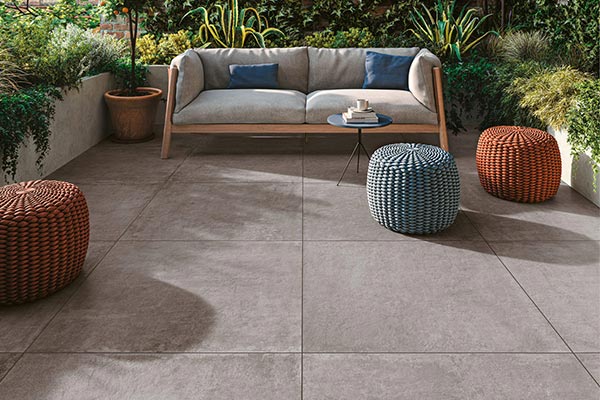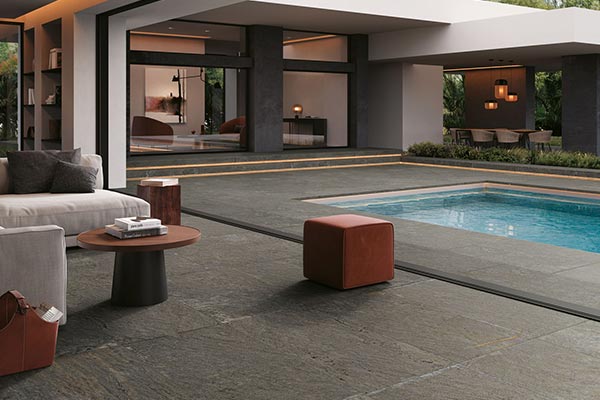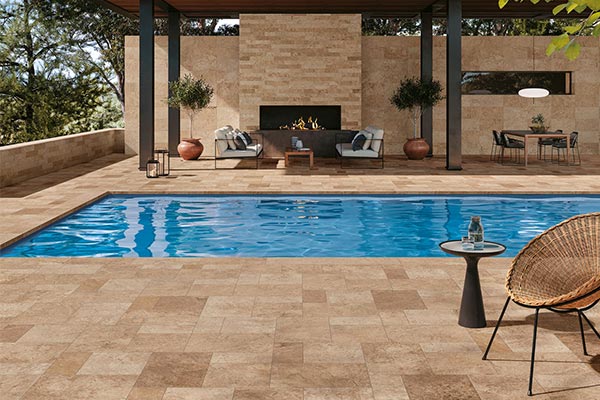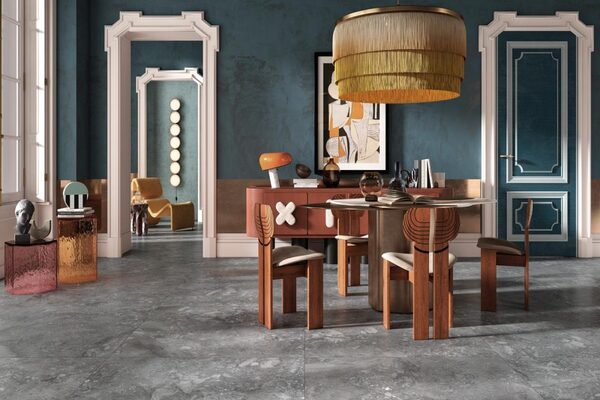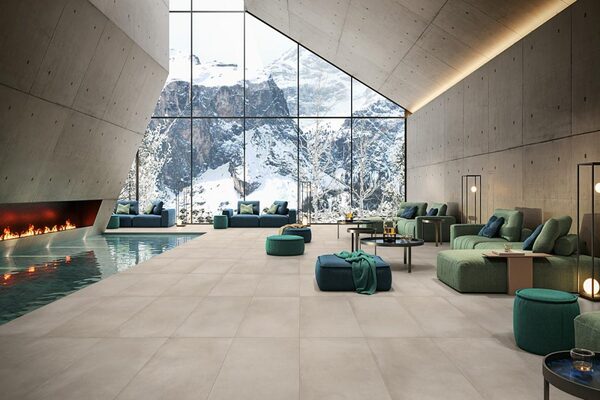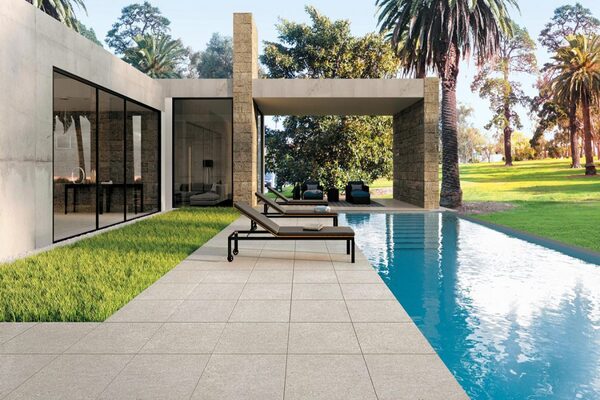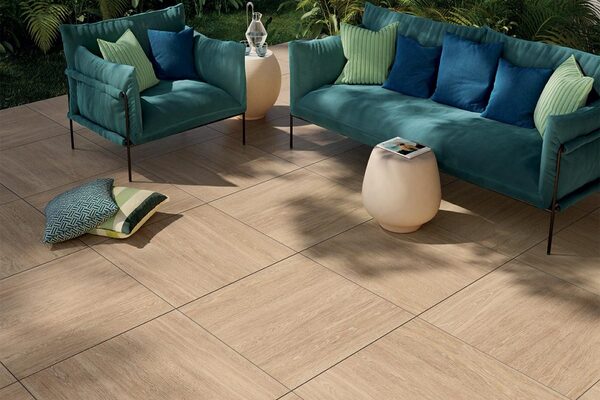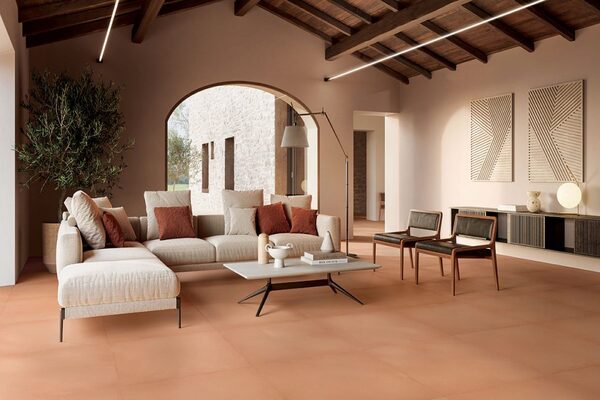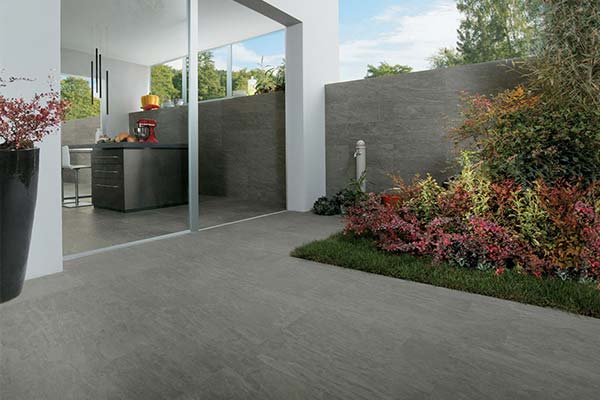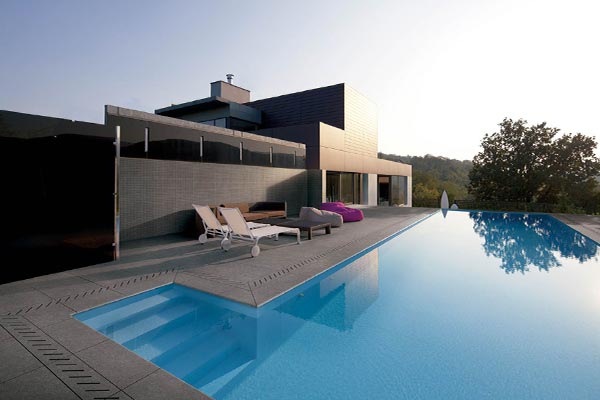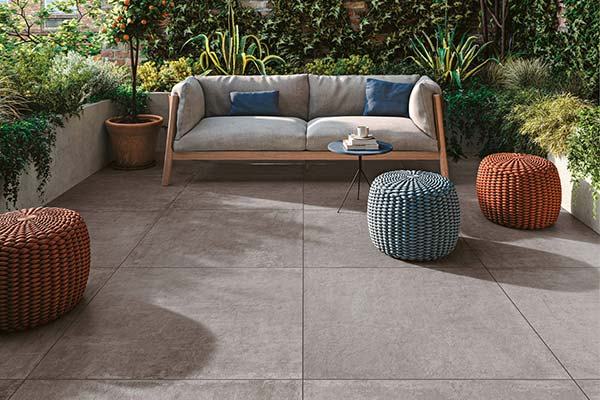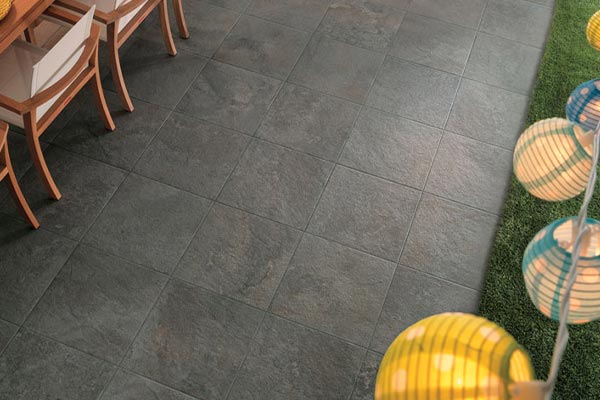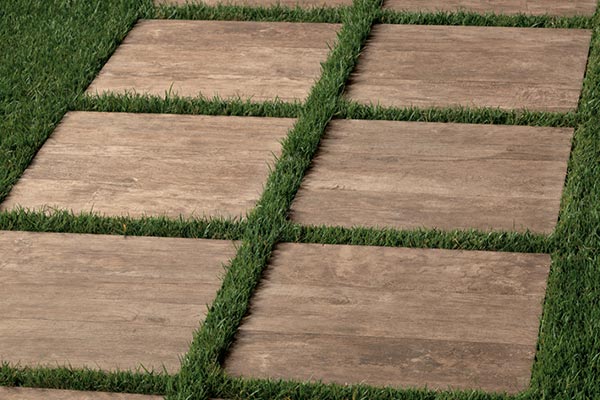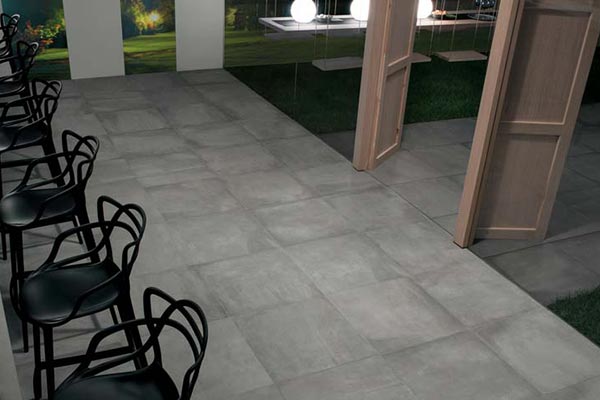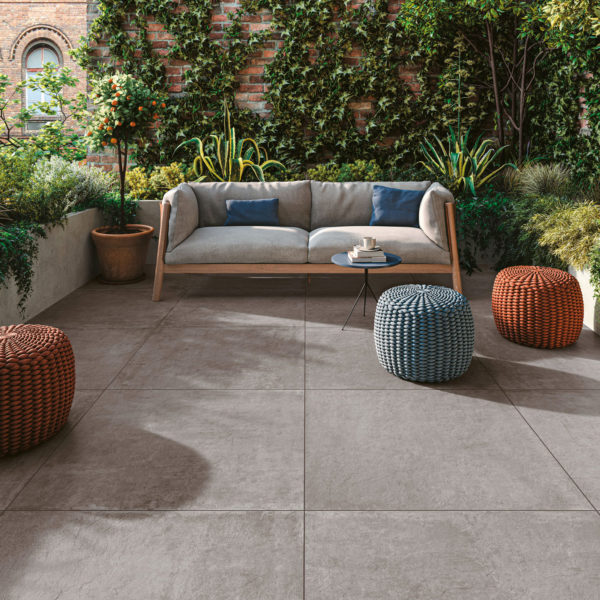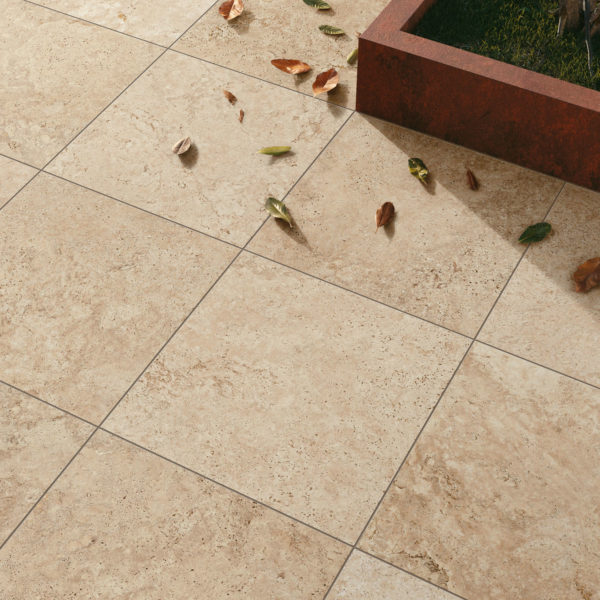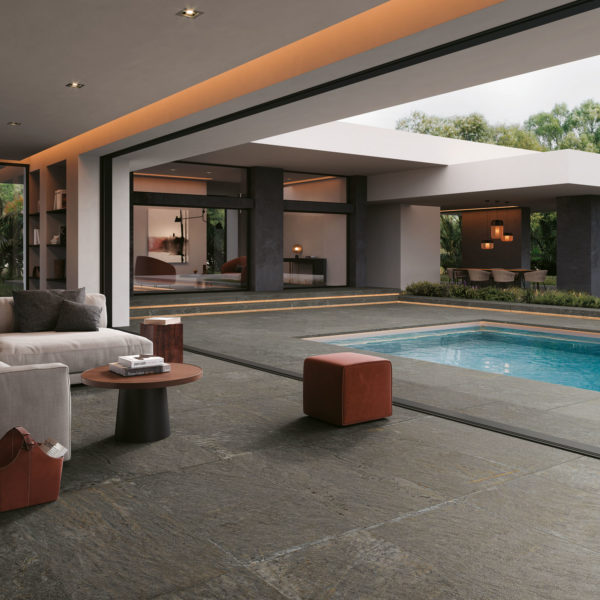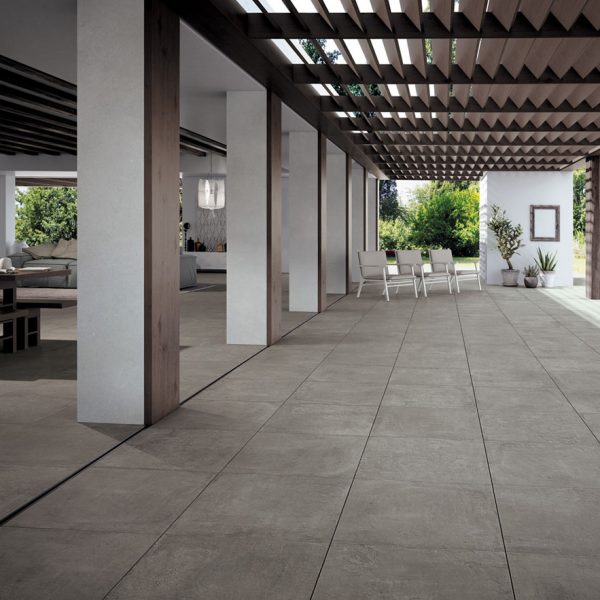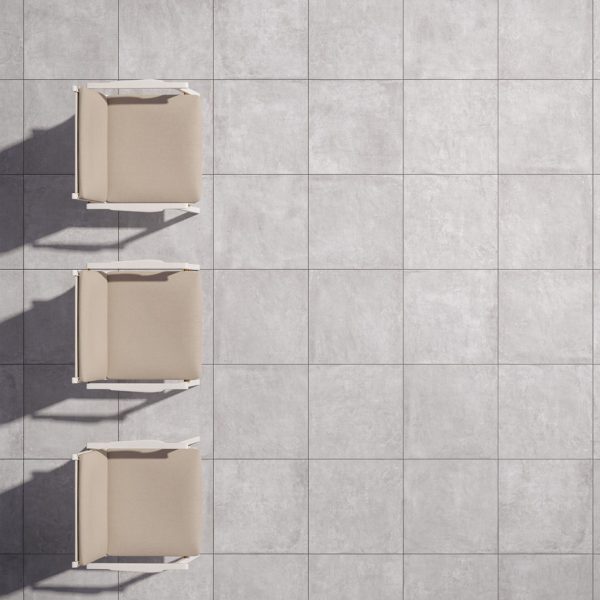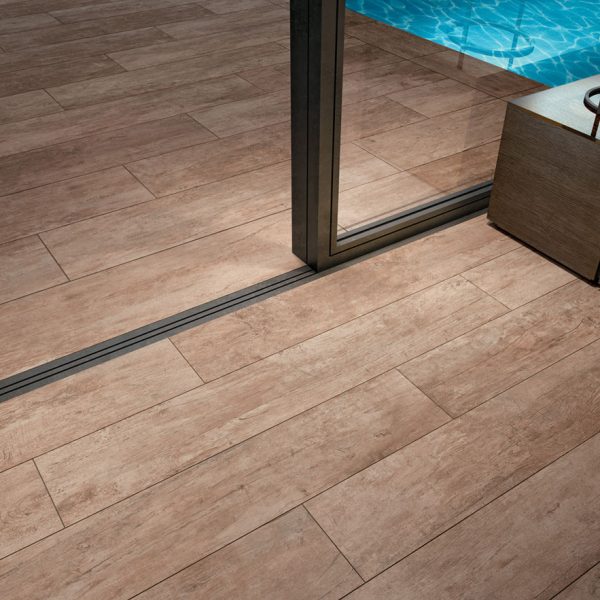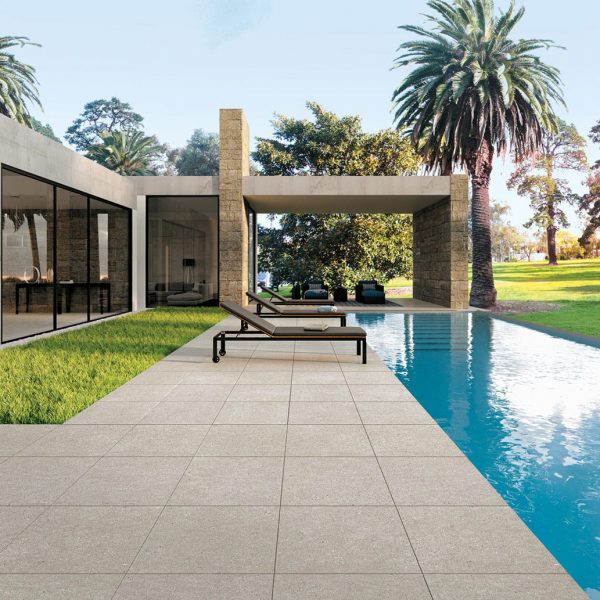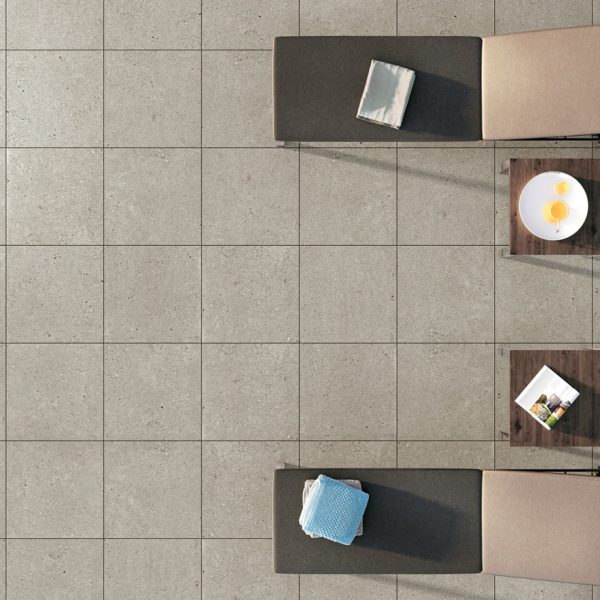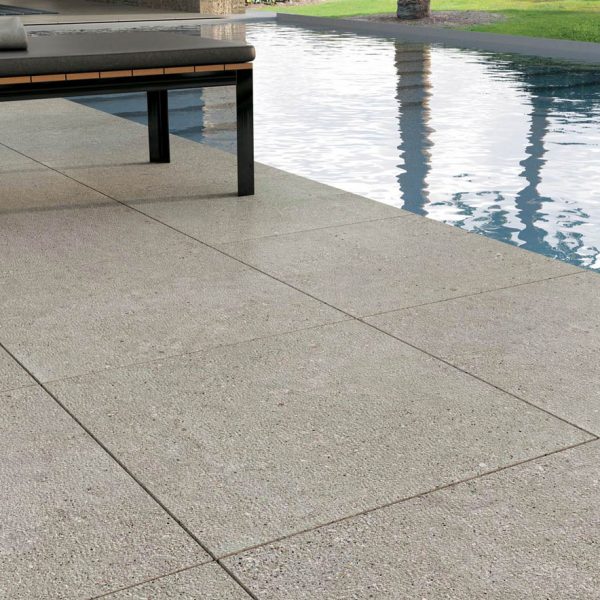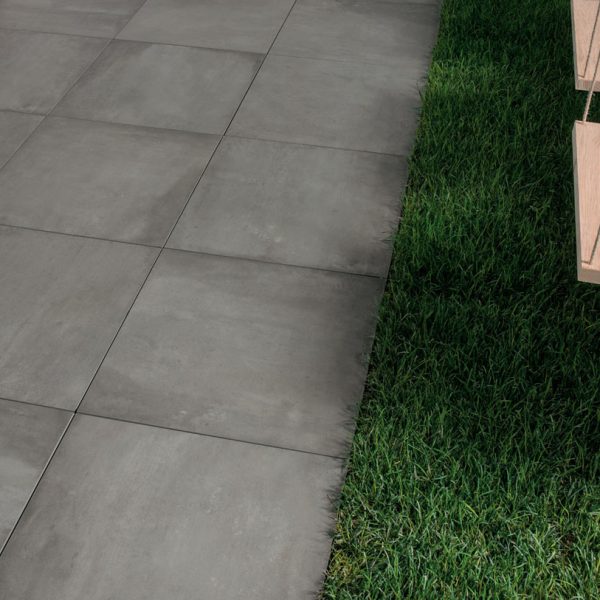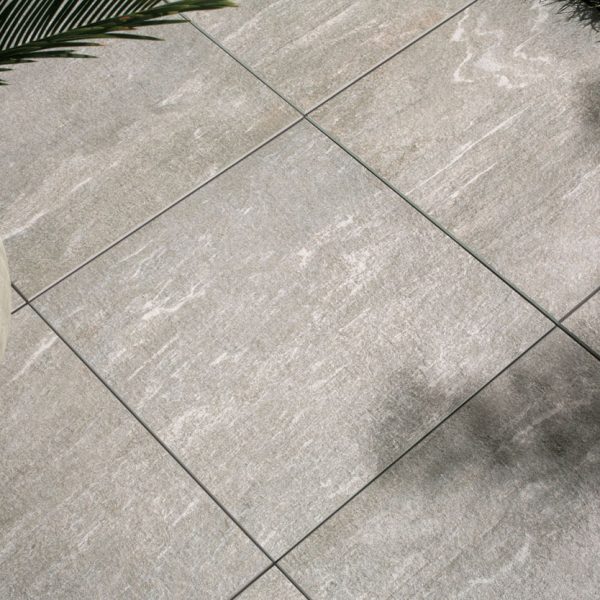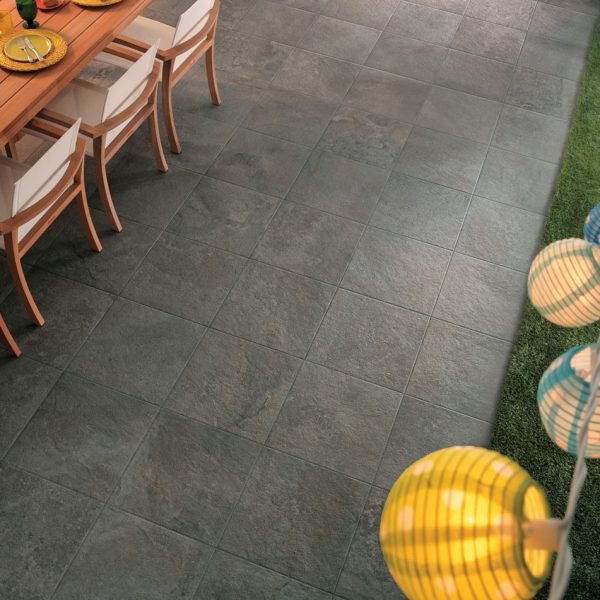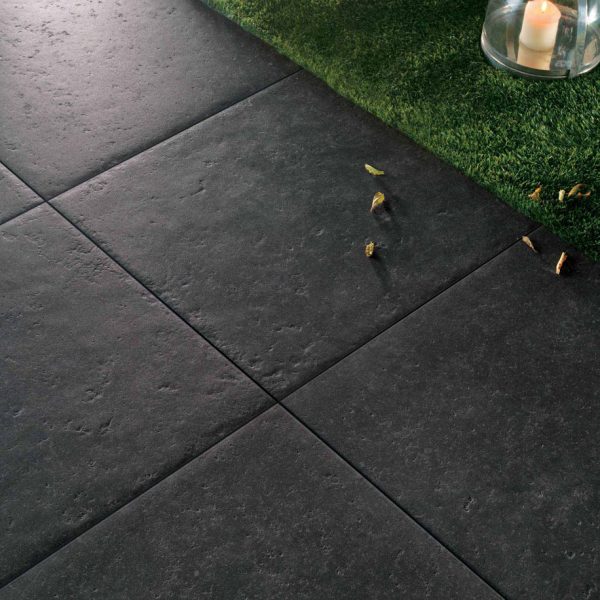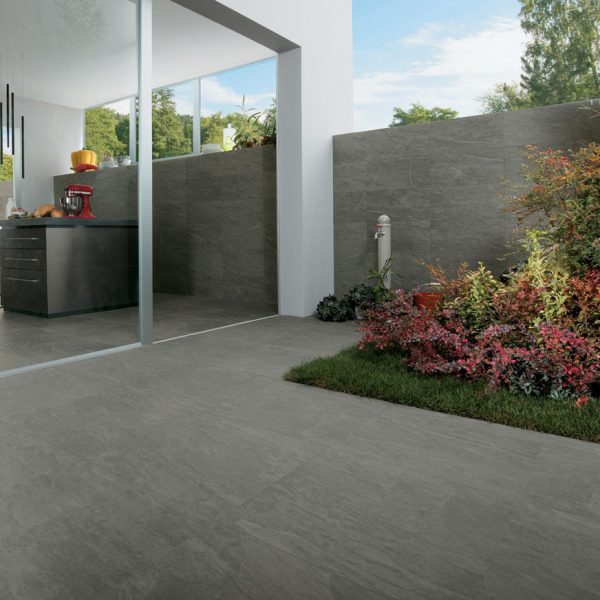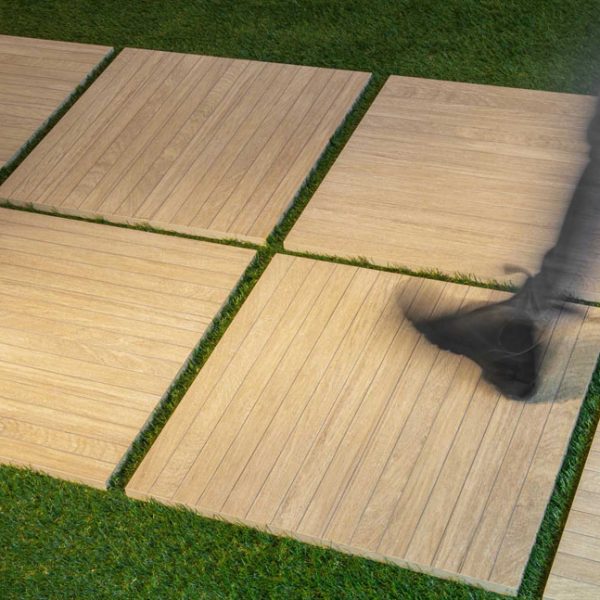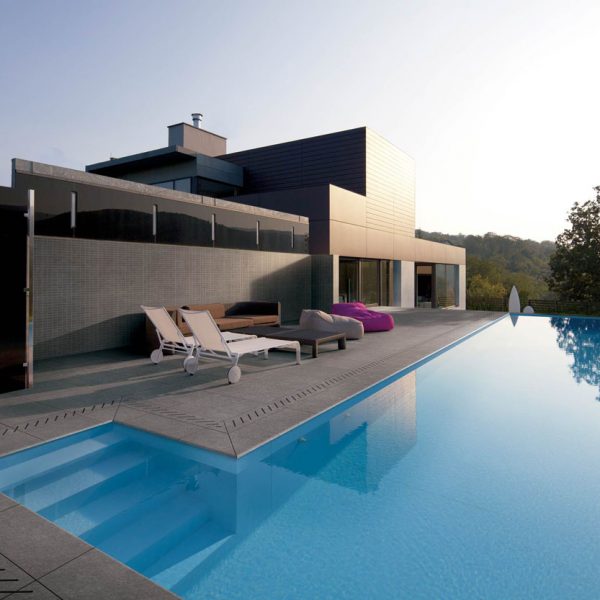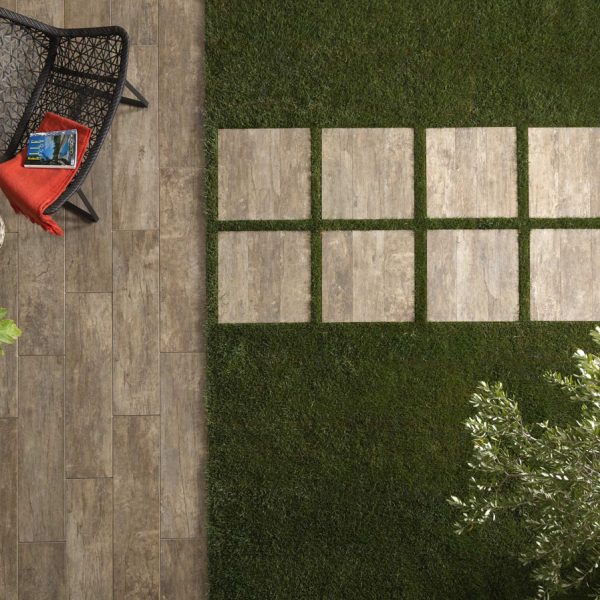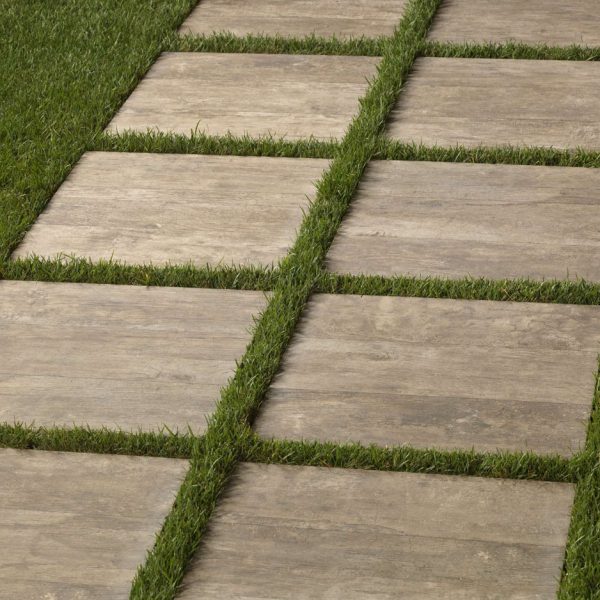Thanks to their technical characteristics, extra thick tiles for exterior installation are the ideal technical and aesthetic solution for gardens, terraces and balconies. Outdoor Plus resists time, loads, abrupt temperature changes, chemical and salt and is also frost-proof. Slabs for outdoor installation of the Outdoor Plus series, with a thickness of 2 cm, can also be used for raised systems, and can be installed on grass (Japanese pathways) and gravel. They can also be installed in the conventional manner, using an adhesive (vehicle accessible installation), and are therefore suitable for any requirement.
20mm Outdoor Porcelain Tiles
Our 2 cm thick outdoor tiling collections
Why choose 2 cm thick exterior tiles?
The 2 cm tile for outdoor flooring that is part of the Outdoor Plus range is the ideal covering for outdoor spaces because it allows you to achieve aesthetic and technical benefits that would normally be unattainable with other materials intended for outdoor use. What’s more, the variety of aesthetic effects available with 2 cm tiles means you can enhance the style of your outdoor space, whether it’s more natural and warm or contemporary and designer.
20 mm exterior tiles: what are the appropriate uses?
The 2 cm tile is best installed in outdoor spaces. Its technical properties make it weather-resistant, and the tiles can be laid using methods other than gluing. Your gardens, terraces and swimming pools are just waiting for outdoor tiling to be adorned with their most beautiful covering… and above all the most practical!
2cm swimming pool tiles
Your swimming pool can now be covered with 2cm floor tiles that set it off perfectly. This area of the garden is often seen as an opportunity to relax, and the collections of 20mm thick outdoor tiles know how to perfect this atmosphere thanks to their different colours.
2cm garden floor tiles
The 20mm outdoor tiling allows you to embellish your garden by creating walkways or paths, even directly on your lawn. The aesthetic possibilities are numerous, so there’s something for every type of project. With this in mind, your garden can be scattered with 2cm floor tiles in a few specific places, which can offer a highly sought-after aesthetic result, alternating it with areas of lawn.
2cm thick tiles for terrace and balcony
The terrace is obviously the centrepiece of our outdoor spaces and therefore deserves special attention, especially when it comes to its aesthetic appeal. The 2cm outdoor floor tiles reproduce numerous aesthetic effects that meet all requirements. You can opt for a wood effect or a stone effect, for example, to really set it off.
The special parts of 2 cm external tiling
To ensure aesthetic continuity within your outdoor space, 20mm outdoor tiling reproduces the same effects as traditional collections. In this way, you can create harmony between your pool surrounds, your terrace and your garden.
The 2 cm thick outdoor tile collections also contain special pieces and accessories for swimming pools and gardens. There are many accessories specially designed for pool finishes – between coping stones, different types of internal and external corners and grilles, the choice is vast.
Garden accessories have also been designed to perfect the small finishing touches to your outdoor spaces. The 2cm floor tile is available in various special pieces, such as containment edges and covers. Your garden will be decked out in its finest flooring, right down to the smallest detail.
The aesthetic effects of 20 mm thick exterior tiles
The 2cm outdoor tiling has a multitude of aesthetic possibilities: it comes in 6 different formats, 3 aesthetic effects and 34 colours. This vast range lets you personalise your garden, terrace, balcony and swimming pool, making each one unique. What’s more, 2cm floor tiles have the same aesthetic effects as the indoor collections. In this case, there’s no risk of a visual break between your interior and your outdoor world.
Your 20mm outdoor tiles can add character to your outdoor floor. Certain aspects, such as wood-effect tiles or stone-effect tiles, are in total symbiosis with and echo the nature that surrounds them. Here, your outdoor world is synonymous with comfort and invites you to relax. These two effects of outdoor tiling 2cm are very rich in detail and reproduce all the aesthetic characteristics of the natural materials from which they are inspired. The variety of colours, from warmer to cooler tones, allows you to personalise your space and give it nobility, sobriety and authenticity.
On the other hand, for fans of modernity, the 20mm-thick exterior tiles also reproduce the effect of concrete and cement. This gives an urban charm and a sober, relaxed look to your outdoor space. With its neutral colours in warm or cool shades, this outdoor tiling 2cm makes your garden and terrace very trendy. What’s more, it can easily be combined with both sober, modern furniture and more colourful furnishings for a colourful result.
The different formats of 2cm outdoor tiles
2cm tiles are available in a number of different formats that are the perfect complement to all styles of decor. Choose from:
2cm thick outdoor floor tiles in square shapes, ranging in size from 60x60cm to 90x90cm. The large 60x60cm format, which is available for 2cm outdoor floor tiles in wood effect and stone effect, unifies your outdoor space while enlarging it. On the other hand, the 90x90cm size, often preferred for large surfaces, is only available in a cement concrete effect that adds a modern touch to your exterior.
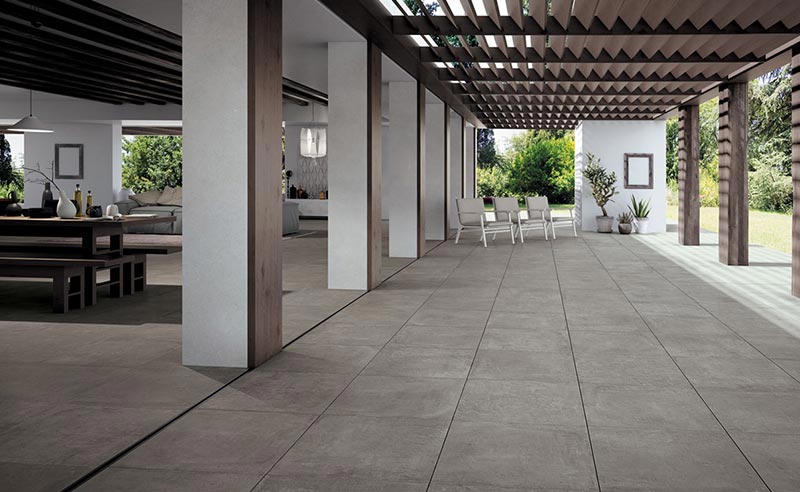
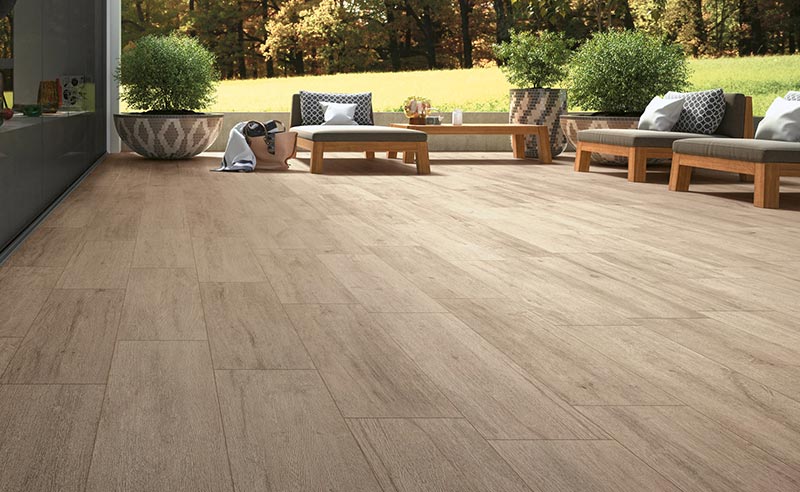
2cm thick rectangular tiles for an original touch. The 60×120, 45×90 or 60×90 cm formats give an impression of length to your outdoor floor and can therefore be recommended for smaller surfaces to create an optical illusion. It’s worth pointing out that 2cm wood-effect outdoor floor tiles also reproduce traditional parquet strip formats, and are available in 30×120 in particular.
Types of installation for 20 mm thick exterior tiles
Outdoor Plus 20mm tiles are made from porcelain stoneware and can be easily laid using a variety of methods. Firstly, it eliminates the need for glue and grouting, and can be laid on gravel, lawns or even on a raised base. Of course, the traditional method of laying glue on screed is still applicable and necessary in special circumstances, such as when installing pool edges in particular.
First of all, the choice of glue-down installation on screed remains the ideal solution for outdoor floors that require high performance for vehicle traffic, for example. In this case, 20mm-thick outdoor tiling is ideal for this type of application, as it is extremely resistant to breaking loads. So, thanks to a glued-down installation, your 2cm outdoor floor tiles can be driven over and can therefore terrace your driveway with light traffic without risk. However, to avoid lifting and other detachments, it is strongly recommended that you apply double gluing and lay joints of at least 5 mm.
Then, 2 cm thick outdoor tiles allow you to create a ‘Japanese step’ style in your outdoor space as they can be laid resting on the lawn. It is advisable to level your outdoor floor to obtain a flat surface before laying. This 5 to 6 cm levelling can be achieved by pouring a bed of gravel or cement to be compacted afterwards. The 2 cm floor tiles must not extend beyond the lawn to avoid damaging your garden maintenance equipment, such as the lawnmower.
Another installation option is available for outdoor tiling 20 mm, namely resting on gravel. This requires a uniform surface with joints of at least 5 mm, and ensures effective rainwater drainage. 2 cm floor tiles offer the advantages of porcelain stoneware and are therefore low in porosity. As a result, it does not absorb water and is therefore unlikely to deteriorate.
There is still the type of raised laying on studs which is, without doubt, an extremely practical solution as it allows you to create space for piping systems or even irrigation. The 20 mm outdoor tiling can be laid on different supports: fixed, adjustable or self-levelling. The tiles can be laid on hard ground or paving stones.
The advantages of 2 cm thick external tiling
First of all, Novoceram Outdoor Plus is a system of non-slip monolithic tiles (R11-R12 according to DIN 51130, B or C according to DIN 51097) 2cm thick that can be laid around swimming pools or on terraces. This reduces the risk of slips and falls, so you can enjoy your outdoor space in complete safety.
Since the weight of 20mm-thick outdoor tiles is limited to 17kg per tile, they are ideal for terraces or balconies, where the static load requires particular attention. In other words, its strength-to-weight ratio is very favourable.
Finally, outdoor tiling 2cm does not see its aesthetic appearance deteriorate due to various factors such as frost, bad weather or even the sun’s rays, which it resists well. This makes it the ideal solution for your terrace or garden, as its aesthetic characteristics will remain unchanged over time. It’s also worth pointing out that 2cm floor tiles have virtually zero water absorption because ceramic is a low-porosity material. This makes it ideal for outdoor installation.
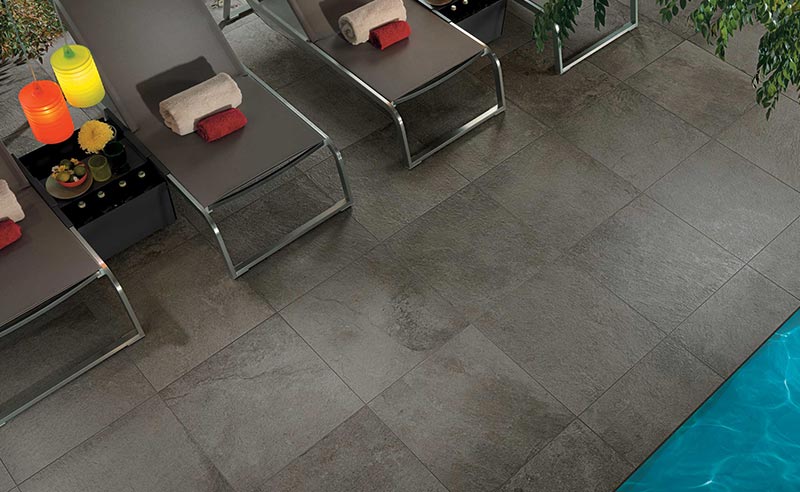
Les questions fréquentes sur le carrelage extérieur de 2cm d'épaisseur
What are the technical properties of 2cm thick tiles?
It’s true that outdoor spaces subject floor coverings to very specific stresses that are different from other uses, such as bad weather, temperature differences and the sun. However, 2cm outdoor floor tiles are highly resistant to frost and retain their technical properties from -50° to +60°. What’s more, its appearance doesn’t deteriorate under the effect of the sun or bad weather, and remains unaltered over time. It is also resistant to swimming pool salts and antifreeze. It’s important to point out that 2cm tiles are slip-resistant to DIN 51130 and DIN 51097 standards, so they have all the technical qualities needed to be laid safely outdoors, including on swimming pool decks.
Do I need to treat my 20mm thick exterior tiles?
The 2cm outdoor tiling is a very low-porosity material and doesn’t require any type of special treatment, even according to the seasons, regardless of the aesthetic effect you’ve chosen. What’s more, your 2cm floor tiles don’t require tedious cleaning – plain water is all you need. It can also be cleaned with a scrubber-dryer or high-pressure cleaner.
Do I have to wait 2cm after laying the outside tiles?
Once the 2cm thick outdoor tiling has been laid, it’s immediately walkable and doesn’t need any lead time. This means you can walk directly on your outdoor floor without having to wait. However, this rule does not apply to glued-down 2cm outdoor tiles, which require a certain amount of time before use, so you can’t walk on them straight away.
